#Good Omens meta
Text
I bought Aziraphale's Bible so you don't have to.
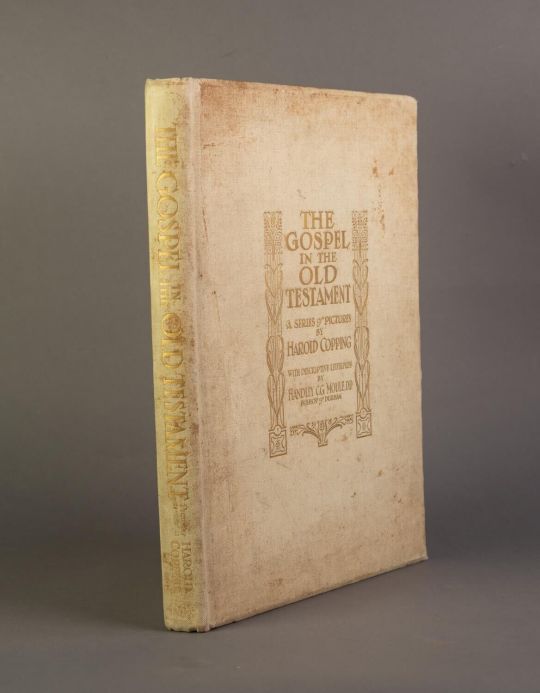

Am I insane? Yes. Was it worth it? Maybe.
In most* of both season 1 and season 2 of GO, there's a very specific Bible on a bookstand next to Aziraphale's desk. It's a vintage illustrated plate book by Harold Copping, known as the Harold Copping Bible, published by the religious tract society in London in 1910. It features some of the most well known Old Testament stories, summarized and annotated by the Bishop of Durham at the time, and illustrated by Copping, who was freshly returned from a sojourn in the middle east. Ironically, It was meant as a lay-person's version of a comic book, short, exciting by use of exotic illustrations, and easy to read.
But my (expensive) gain is now your gain! As I've collected here every visible page in both seasons for your reading and viewing pleasure.
Season 1: All episodes
Adam & Eve
Genesis iii (1:3) / HCB page 10

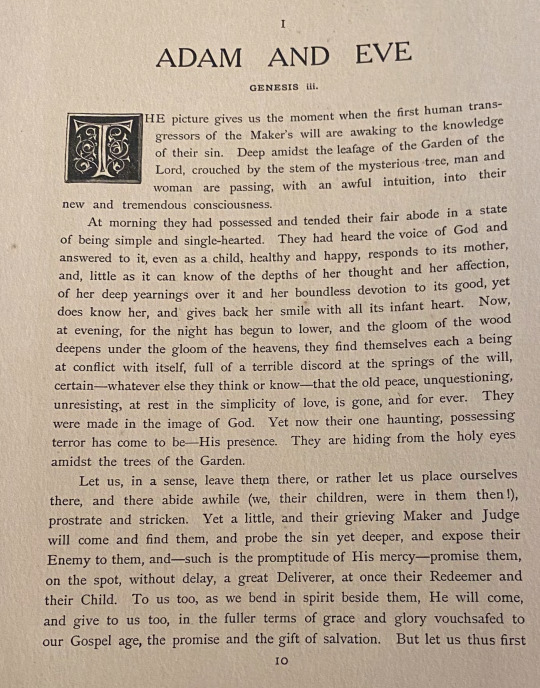
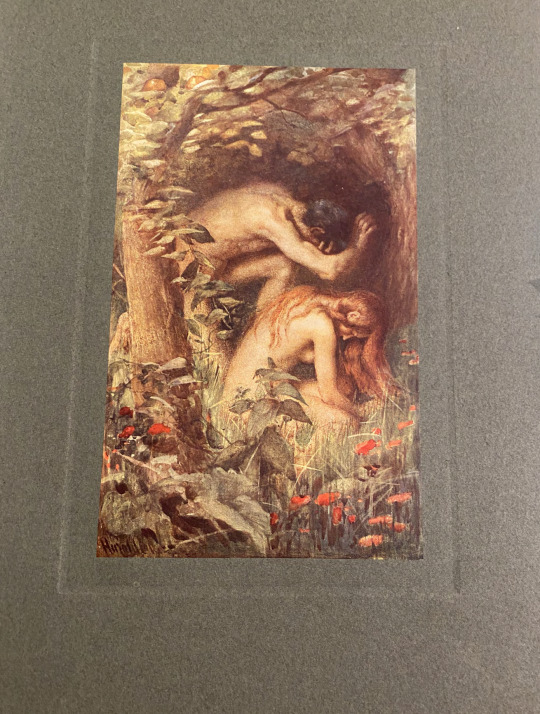
Season 2: Episode 1
Joseph known to his brethren
Genesis xlv (1:45) / HCB Page 28
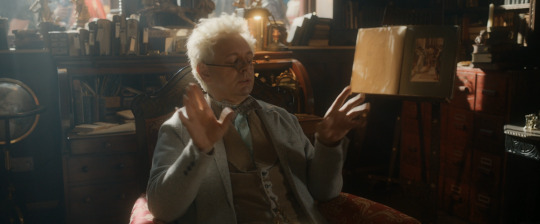
S2E1 14:21, S2E1 17:41, S2E1 39:45
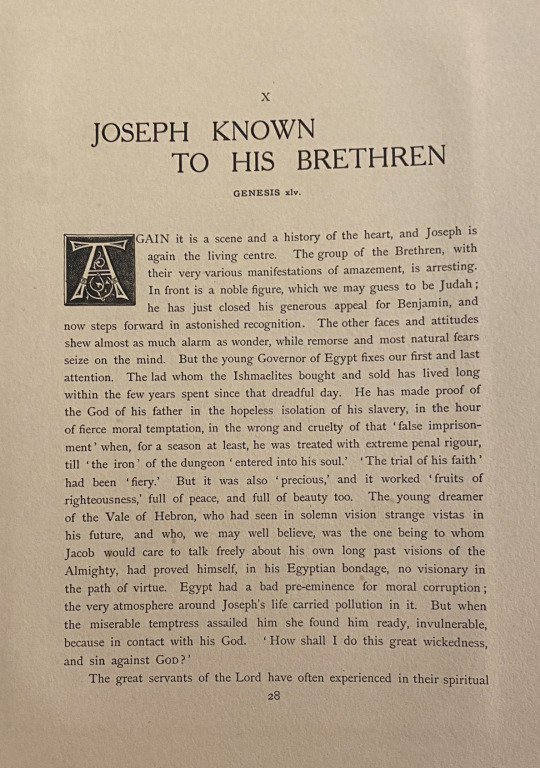
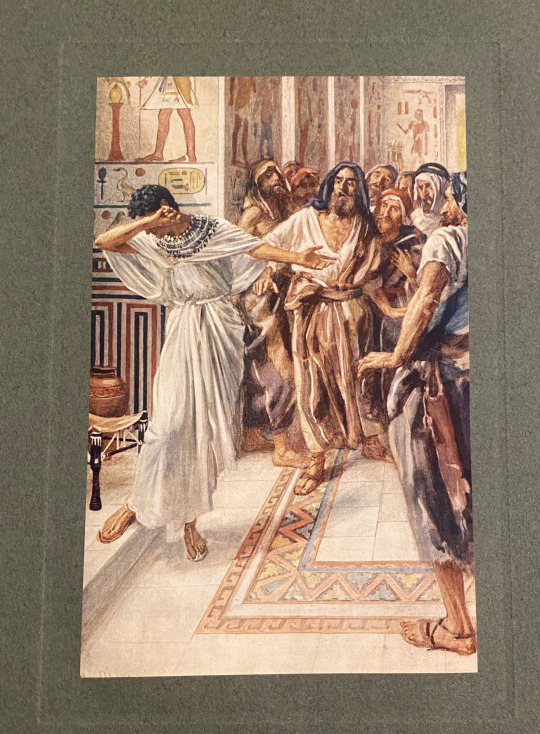
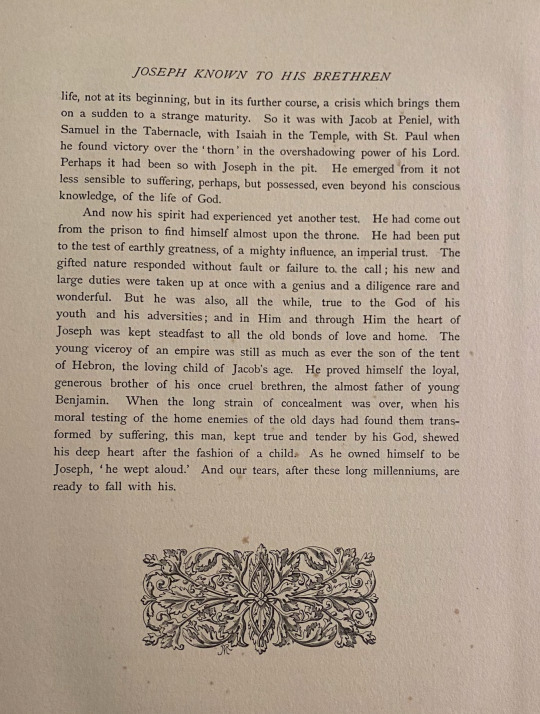
Season 2: Episode 2
Jacob's vow
Genesis xxviii (1:28) / HCB Page 22
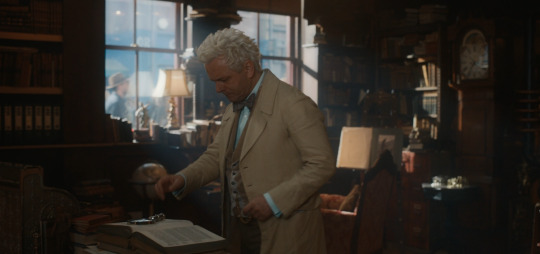
S2E2 5:49
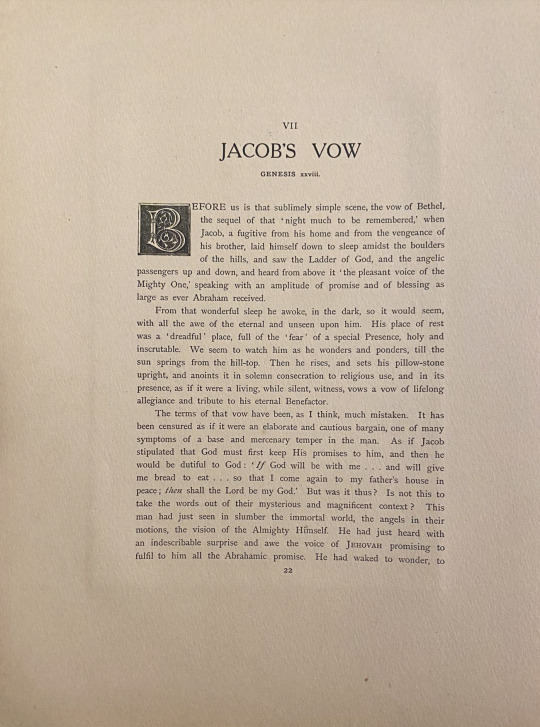
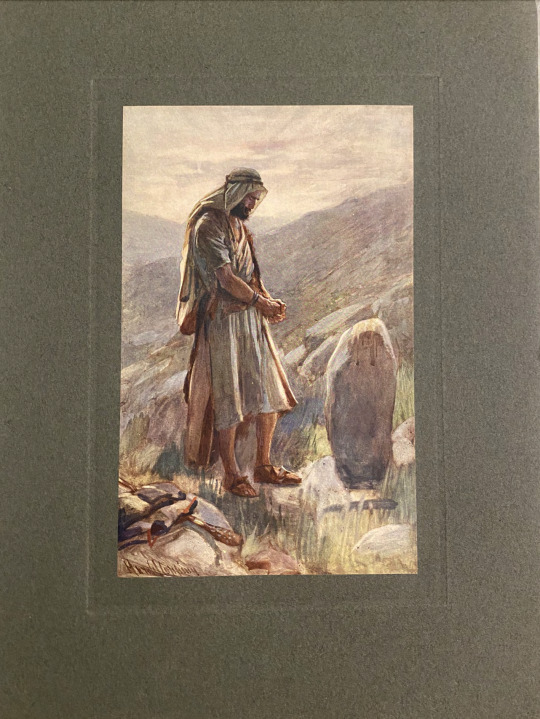
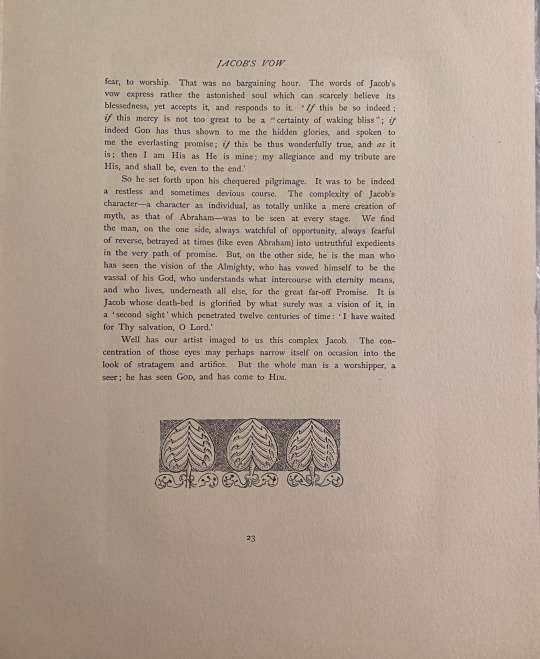
Season 2: Episode 2
Joseph known to his brethren
Genesis xlv (1:45) / HCB Page 28

S2E2 13:38 (see S2E1 above)
Season 2: Episode 2
The Brazen Serpent
Numbers xxi (4:21) / HCB page 36
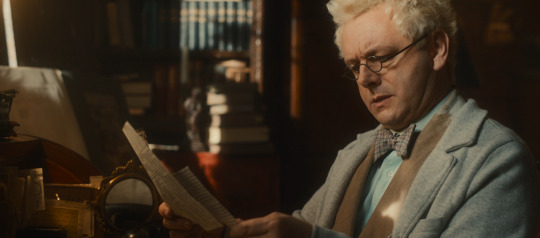
S2E2 16:12, 43:40
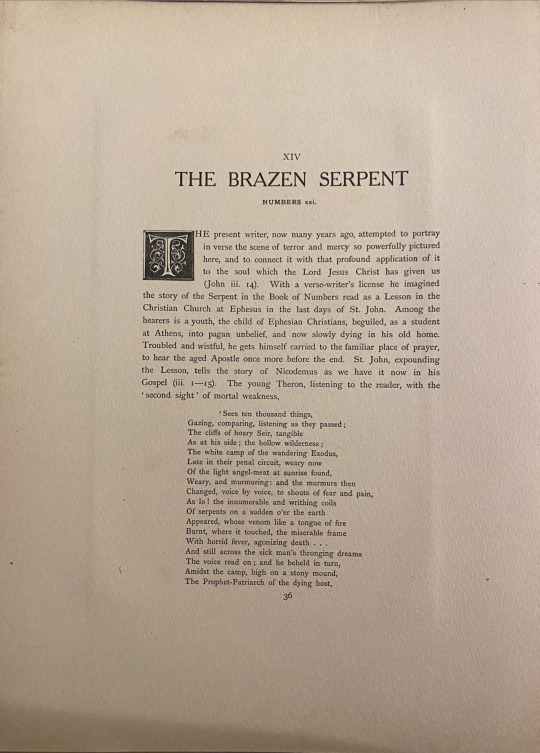
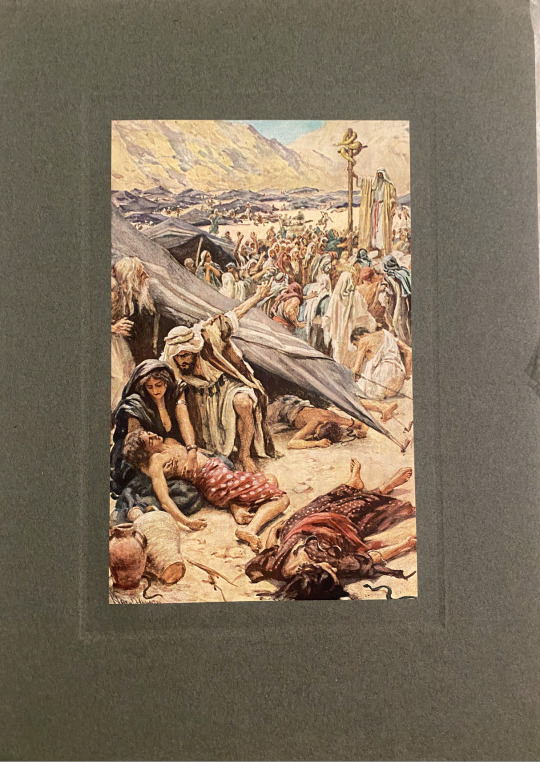

Season 2: Episode 2*
Bible on the desk, Magazine on the stand
Annuel L'art Pour Tous, Cover (1861-1880 most likely)
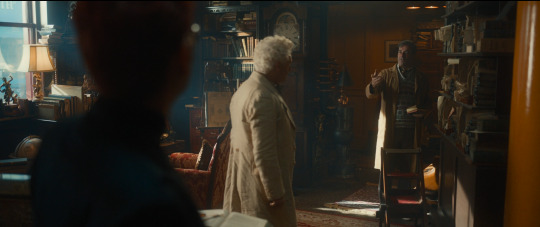
S2E2 22:10

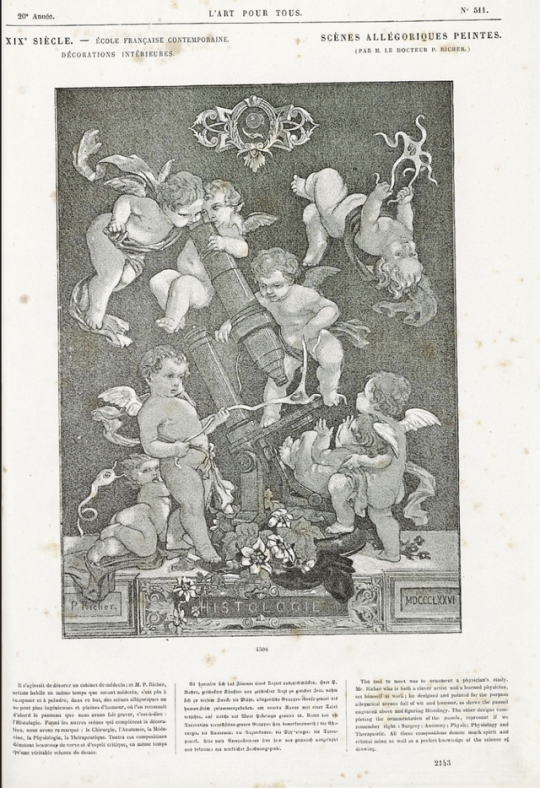
The French L'art pour tous industrial design periodical will have to be a story for another post. For now, just enjoy this 1880 edition copperplate of cherubs discovering a microscope...
Season 2: Episode 2
Imaginary page from HCB, Job
KJV Job (18:1) / HCB N/A
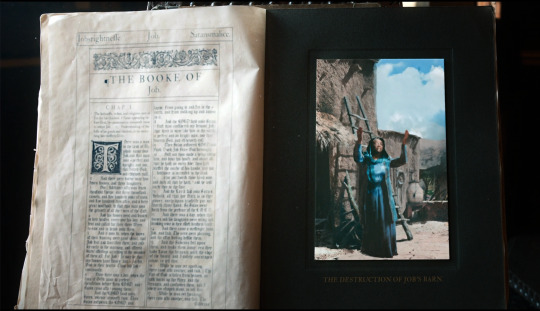
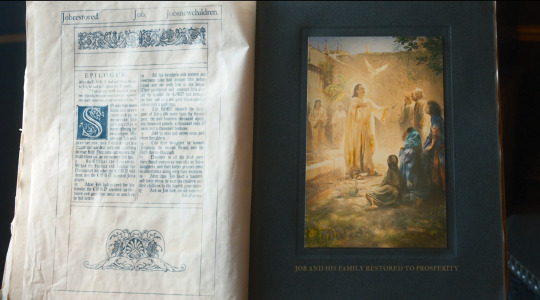
S2E2 22:29, S2E2 40:05
Obviously, the plate illustrations and text look different here than in the real bible, because they were created for the show. But there are a few more particularities here. For one, this layout with the thin grid around the text, as well as the paragraph symbol next to the first title, indicate that this would have been a printer's proof copy, not a finished book. It shows you the layout grid and can be annotated for changes. Second, there seems to be a war going on between fonts. Where the "chapter" of Job begins, we get a font and a style similar to the original bible, which gets rudely interrupted by a dropped capital (from the real book) and a Gothic-style font/verse numbers like in the original King James version of the printed Bible.
Season 2: Episode 3
The Brazen Serpent
NUMBERS xxi (4:21) / HCB page 36
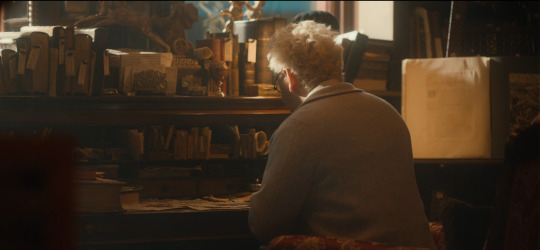
S2E3 1:18 (see episode 2)
Season 2: Episode 5
By the Rivers of Babylon
Pslam cxxxvii (19:137) / HCB page 52
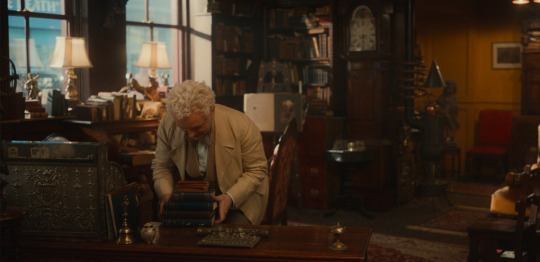
S2E5 21:20
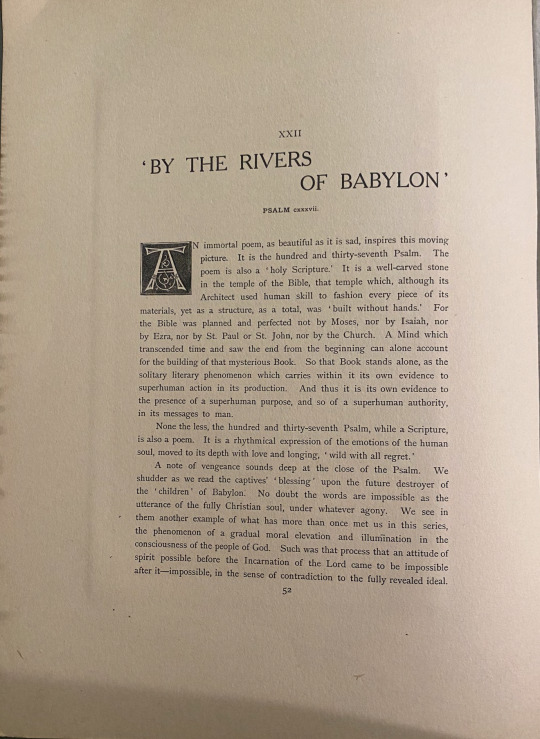
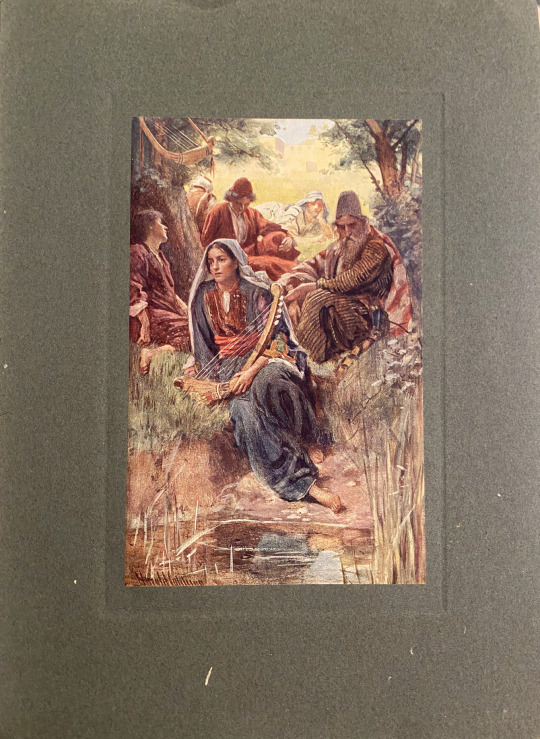
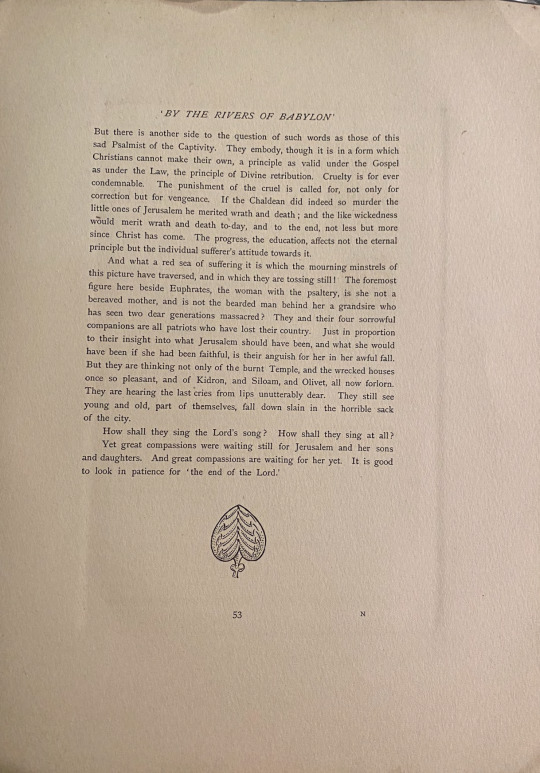
Season 2: Episode 6
Bible missing, L'art pour Tous on the stand
Annuel L'art Pour Tous, Cover (1861-1880 most likely)
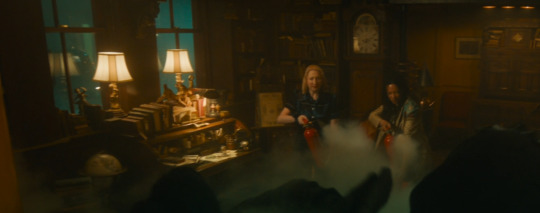
S2E6 10:21, 17:21, 18:15, 34:28 (see episode 2)
Season 2: Episode 6
Closed HCB, L'art pour Tous on the stand behind
HCB page 0
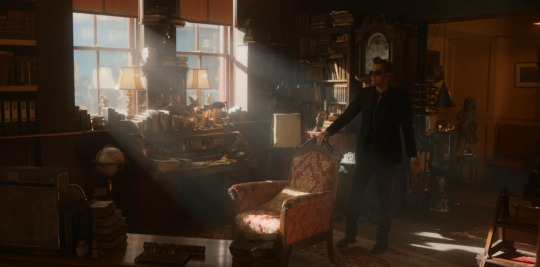
S2E6 37:58, 44:20, 48:08
#good omens 2#art director talks good omens#good omens meta#go season 2#go meta#good omens season 2#good omens season two#good omens#go2#good omens prime#aziraphale#crowley and aziraphale
518 notes
·
View notes
Text
Some Random Thoughts on the Nature of Free Will
Thinking about that conversation from the book that got put into The Resurrectionists. Aziraphale is explaining how he and Crowley are good and wicked, respectively, but they have no choice while Elspeth does. Bc humans can't be truly good unless they have the choice to be wicked.
(This is where I usually end up arguing with someone on Twitter lol bc they think Aziraphale is being Mean to Crowley by calling him wicked. It's just a brand name darling, not a judgment call. He literally said in the same breath that he's not TRULY wicked bc he wasn't given a choice.)
So I'm sitting here thinking about free will and the choices the celestials are given, which are not many. And I wonder if one of the reasons they were drawn to the Arrangement was to give them each the choices that humans were born with. One can't be truly good without the opportunity to do wrong, so perhaps being able to work both sides of the equation helped them develop into truly moral beings and not just extensions of their offices. We see in Uz how they're able to work together and bounce off each other to save Job's family, even though the Arrangement didn't properly exist yet.
I've also seen lots of takes and metas that indicate that people view Heaven and Hell as a class system: Heaven is the upper-class privileged majority, while Hell is oppressed, kicked out, downtrodden. I think people forget that the primary difference between the two is aesthetic. Hell has all the same powers as Heaven, and they both intend to burn humanity to the ground in order to prove their gang is best.
No, if we're going to talk about who's got privilege, it's definitely humanity over heaven or hell. We have free will and imagination, which are more miraculous than anything. Sure they've got all these powers and can work miracles and so on, but where's that gotten them? We can actually change things. All they can do is try and influence us to change things, and their success rate isn't high. Two of the most powerful beings in the universe couldn't convince an eleven year old boy to blow things up. That's. Pathetic, actually.
Which brings me back around to the ineffables. Because they actually DO have free will, but I don't think they're used to realizing that they do, which might be why they act a little bone headed sometimes. The show implies and the book comes right out and says that they picked it up from being around humans. And like I said earlier, I think the Arrangement played a big part. They were actually able to choose to do good or evil, a luxury that normally only humans can enjoy.
And the best part of this, for me anyway, is knowing that everything that they are to each other is a conscious choice. Aziraphale didn't want to be a fighter, so he gave his sword away and made the conscious choice to be soft and silly and get into scrapes. And Crowley chooses to come to his rescue because he likes it, not because he is obligated. It's a way for him to choose to do good without getting in trouble. They are each other's outlet to explore humanity in a way that would be impossible if they were on their own.
Aziraphale speaks French badly and flutters his eyelashes and plans elaborate Balls because he loves doing human things and he wants to do them with Crowley. Crowley drives a sleek classic sex machine with bullet hole stickers on the windows and goes on capers and performs daring moves because he loves doing things the human way and he wants to do them with Aziraphale. The way they interact and work together because they WANT to, and not because it's their Great Bloody Destiny or whatever, is so fucking beautiful to me.
#aziraphale#good omens#crowley#ineffable husbands#aziracrow#aziraphale my beloved#good omens meta#crowley good omens#free will#heaven and hell
124 notes
·
View notes
Text
"Trust me"
Episode 1, 19m50s: "Either call on the phone to talk or appear mysteriously, don't do both." "Why not?" "ngk, trust me"
Episode 2, 37m30s: "Do exactly what I say, trust me" (Crowley to Sitis)
Episode 3, 33m43s: "Trust me, if Hell noticed that little display, I'd already be - "
Episode 4, 30m30s: Aziraphale to Crowley before bullet catch
I haven't had a chance to comb through episodes 5 and 6 yet, but it feels significant to me that this phrase is used once per episode (so far).
Thoughts?
PSA/reminder to not ask Neil about this or any meta!
#gos2#good omens#good omens spoilers#aziraphale#crowley#good omens meta#good omens theory#not really a meta or theory but it's in that category kinda#just yeeting this into the void
72 notes
·
View notes
Text
One of my bitchiest and yet most objectively correct goomens opinions is that basically no one knows how to do the "Crowley calling Aziraphale 'angel'" thing correctly. People manage to both make him do it Way too much while at the same time making it out to be this Immediately 100% Intimate thing. It most certainly carries some of the romantic/homoerotic connotations as it would for human characters, and I think both the text and Crowley in-universe are extremely aware of this, but it also carries something else with it when the person in question literally is an angel. It can be affectionate, but it can also be a neutral statement of fact, or it can even be mocking or disparaging. "Doing good again, angel?" is like the in-universe equivalent of Crowley loudly revving his motorcycle and calling Aziraphale a square
#not that revving your motorcycle and calling someone a square can't be homoerotic in and of itself#but that needs to be like The Dynamic. i like that sort of teasing for them though i think it's cute#open mick night#good omens#gomens#crowley#aziraphale#aziracrow#ineffable spouses#good omens meta#??? sure! sure. who gives a shit anymore i do what i want
98 notes
·
View notes
Text
God, they really do love a shoulder angel-demon framing moment.

And I'm starting to HATE that bust. Far too ominous.
This one's for you @melbatron5000
#good omens#good omens 2#good omens meta#aziraphale#crowley#crowley x aziraphale#good omens theories#good omens clues
85 notes
·
View notes
Text
What if i-forgive-you-message wasn't a resentment?
Wanna some optimisic (not really) interpretations? I know you want, just admit it.
Crowley believes he is unforgivable. He can't be forgiven. What if Azi's "I forgive you" is just a little gift. A farewell gift.
Like. His best friend leaves him forever (as he thinks). I will miss you, dear. All I can give you is this forgiveness.
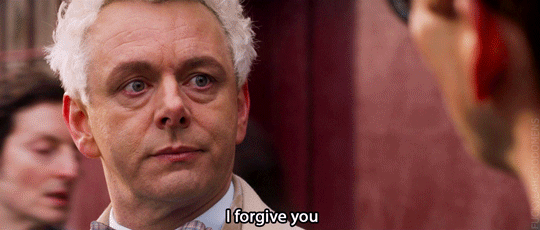
He stands in front of Crowley. His best friend. His soul, who is desperately trying to keep him. Upset and pained angel, he cries from the parting. I am losing you, my heart and pulse. My return to Heaven hurts you, but I must do this. Let me give you forgiveness as an atonement. Hope you'll also be able to forgive me once.

#good omens#good omens 2#what if#crowley#ineffable husbands#aziraphale#good omens meta#go meta#good omens analysis#aziraphale x crowley#aziracrow#crowphale
66 notes
·
View notes
Note
Please tell me you have an idea when it comes to how "A Nightingale" becomes their song in 1941? Everytime I think about the last part of that, I can't get the song to fit. Any thoughts?
I haven't written it all out in an actual post, but my current theory is that it actually didn't become their song in 1941-- because it already was by then... because Aziraphale wrote it for Crowley in 1939.
He gave it to Eric Maschwitz and Manning Sherwin the way that Crowley gave his love poetry for Aziraphale to Shakespeare. 90 years ago is the 1930s, not the 1940s, and "90 years ago" was brought up a few times in S2. The song was also written and first performed in a French fishing village and is full of references to Ineffable Husbands-y stuff, so... might it be their song because it's literally their song? Hmm...
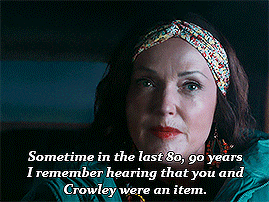
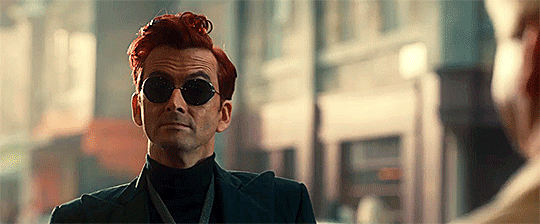
56 notes
·
View notes
Text
GO Timeline: In the Beginning
I asked Neil Gaiman, “how it is possible for them to have talked for millions of years” (Crowley, S2, Ep6), and Neil said “because there was lots of angel time before Earth time started.” THUS:
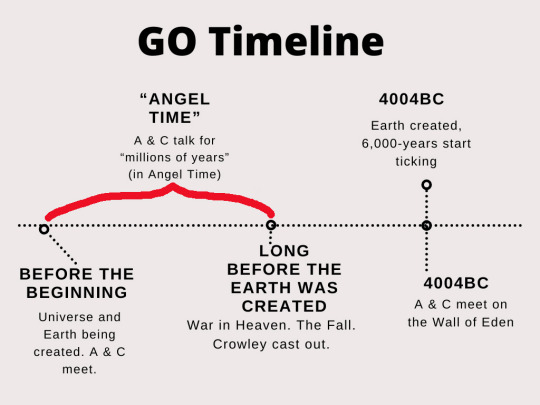
“They’ll be shutting this all down in 6,000 years" either refers only to the Earth (perhaps Azi misunderstood the "word from upstairs", i.e., it didn't refer to the whole universe) OR it's simply "angel time years" which can mean anything.
During that “lots of angel time” (i.e. what Crowley means by “millions of years”), AFTER that first meeting, and BEFORE the Earth’s creation, there is a very, very long time for Aziraphale and Crowley to get to know each other.
This is confirmed by the following ask/reply from August 23, 2023:

NEXT, the Great War/Rebellion happened. In Series 1, Gabriel says, “There was war in Heaven long before the Earth was created. Crowley and the others were cast out.”
How long? Who knows? Then the Earth's creation was finally completed, and its 6,000-year timeline started ticking. And when they meet again on the Wall, Aziraphale has to ask for his friend’s new demon name.
Note: in the bandstand scene, when Crowley says, “How long have we been friends? 6,000 years.” He means, how long have you and I-As-the-Demon-Crowley, not the Angel you knew who I no longer identify with been friends. This is also pointed out in the Job minisode, when Aziraphale firmly states that he knows “the angel you were”, and Crowley firmly denies he’s the same person (“the angel you knew is not me”).
But of course, we all know that some essence of Angel Crowley remains, because of the way he is still “a good person” at heart, right? Right. He can try to deny it, but it’s still there, and Aziraphale knows that. This is why they can stay friends, and why they can love each other.
32 notes
·
View notes
Text
Finished Re-Reading Good Omens

I've finally finished re-reading the Good Omens book. I prefer to read books as ebooks, so I did. I use Kindle in particular.
On the last spread, whether through the web browser or the app on my PC, there are three instances of the word "pocket" (two versions in plural form). Rule of Three. Pockets!!!
There's a chapter break, then the overall ending paragraphs that have eight instances of the word "imagine".
I double-checked my paperback copy out of curiosity. I confess I bought this paperback copy because...David Tennant's on the cover. But it's convenient to have a more readily tangible version of the book to check this stuff.
So, in the paperback copy, those three instances of the word "pocket" are on the last numbered page for the contents of the story itself.
The section that uses the word "imagine" eight times is on the next page and not numbered.
...
So, to anyone new around here or wants a general reminder of my theory stuff...
Earthly Objects is a large, difficult hidden game in Good Omens 2. It's a layered game the characters play, and then an audience member can play trying to figure out how the game works.
It has a Rule of Three. It has 6 Threshold Tricks (3 Simple, 3 Complex) as findable, solvable puzzles. Each one is special in its own way, but one in particular—The Pocket Trick—is a hidden giant with a giant impact on many things, including the other 5 Threshold Tricks.
The Threshold Tricks are very, very complicated but based on simple ideas I call "core concepts". That's part of the puzzles to solve.
The Pocket Trick's core concept is, "Think outside the pocket," because it requires using one's imagination with assorted word play to solve the puzzles within it.
Another of the 6 Threshold Tricks is The Sunglasses Trick. It has eight touches.
One of the interesting hidden messages for The Pocket Trick that I'm not sure I have properly down in the wording and never posted goes something like the following..."If you played far enough to find The Pocket Trick to begin with, you've been using your imagination with word play all along." It's a small comfort when dealing with The Pocket Trick's astronomical level of difficulty.
Anyway, the reason I bring up that message is because to solve The Sunglasses Trick—the one with eight touches—I had to imagine the sunglasses were a door to Crowley. The core concept I eventually named for it was, "Crowley's sunglasses are his door to himself." It was the next-to-last Threshold Trick I solved (in a broad sense).
While Crowley himself isn't actually in this last spread of the book since it's about Adam, there is mention of a "cobra" (a snake) in the following sentence, "With the speed of a striking cobra the boy was up the tree."
...
This reading hasn't really helped me solve things further in my desperate attempt to improve my play, but it does make me feel I'm on the right track and have been on the right track with the Earthly Objects game, the Threshold Tricks, and The Pocket Trick in particular.
...
I don't know if I'll have more to say later, but I really wanted to get something out of my system after seeing the word "pocket" used three times.
#crowley#good omens 2#good omens#good omens s2#david tennant#good omens season 2#good omens meta#good omens analysis#good omens crowley#crowley good omens#good omens theory#good omens theories#good omens fan theory#good omens clues
33 notes
·
View notes
Text
Okay, there are two things about the ending of GO S2 that I cannot get out of my head after finishing the rewatch:
1. Gabriel's descent to earth
2. Aziraphale's reaction to the offer of Metatrash
(The rest under the cut)
The thing about Gabriel's descent to earth is that when he comes down to earth, he has not been fired yet. He decides to come down.
What's interesting about this is that in the last few minutes of the last episode Gabriel says his original plan was to leave heaven to go to hell, to join Beelzebub.
The quote goes:
Beelzebub: "Silly, silly angel. Why?"
Gabriel: "I was coming to you, but I... I forgot."
So... he had not been fired yet (because he left heaven before Michael and the lot could get a hold of him again). And he had originally planned to go to Beelzebub ("oh, you're sending me to hell, aren't you?" -> he was kind of counting on that). But after hearing he will lose his memory and go down to earth, he decides to ditch that plan and make himself forget all of it to go to earth (where he did not really intend to go in the first place) to give a box to Aziraphale that says "I am in the fly", that he knows will make him remember.
Why?
My working theory is that since he was the highest ranking angel, he knew about the plans of heaven. He knew about the second attempt at Armageddon of course and he did not want that to happen, because of his love for Beelzebub and the war that would break out. But I reckon he also already knew about the Second Coming.
And by wiping his own memories, he deleted that knowledge for all of heavens associates. But by storing it in the fly and transporting that to earth instead of hell, he brought it to the safest place he knew.
"The Second Coming will be a fearful, mournful time for the wicked, but it will be a day of peace for the righteous."
I don't know if I am reading something into it here, but to me it also sounds like a clue. The only other pair that kind of unites the powers of heaven and hell like Gabriel and Beelzebub is Aziraphale and Crowley. And we know that connection to be quite a strong one (as seen by the "teeny tiny miracle" that ended up sounding every god damn alarm bell in heaven). Crowley is a fallen angel and does not particularly care for heaven or hell and Aziraphale is still an angel and also does not conform with everything that heaven does. And Gabriel knows that.
BUT as far as we know, neither Aziraphale nor Crowley have had contact with the fly or the memories. For now we only know Gabriel kept his memories out of heaven by going to Aziraphale and that he probably knew more than he let on.
The question is, does the fly still exist or did it get destroyed when it went into Gabriels eye?
Also, given the CLUE that takes up almost half an episode - the part of the song that we don't really get to hear is this:
"Everyday seems a little longer,
Every way, love's a little stronger"
Everything we have seen points to an ending where you don't have to choose a side. Where there is no need to categorize into black and white, but to just accept shades of grey. Which is obstructed by heaven (the big corporate agenda, that needs people to think in black and white) and hell (which holds the outcasts that could not keep up with the agenda, but still cling onto it in their own competitive way).
Okay and this is the perfect transition to Aziraphales reaction to the Metatrons offer.
Because after years (or millennia in Aziraphale's case) of being oppressed and silenced and having to be careful around everything he says, I think Metatrons offer to put him in charge of heaven is in Aziraphale's eyes the only perspective of ever getting out of his misery while still doing good.
He *could* have given up heaven and fallen like Crowley, joining him that way, but instead he takes the route of trying to take Crowley with him to the very top of heaven.
Which, in my eyes, is a very very clear sign of the abusive relationship he has with heaven.
I don't think he realises that he is still just a pawn in a big chess game, also and especially as archangel of heaven.
As both Beelzebub and Gabriel said: "As if we make the rules..."
That is not how it works.
(I also find it very interesting, that the voice of god (basically the manager of heaven) asks if anyone ever "asks for death" (I mean, come on) whereas god, talking to Job, is genuinely fascinated by him and his goodness.)
I don't know if I can put this thought process into proper words, but I feel like the problem is that Aziraphale is still clinging to the whole concept of "doing good" and preserving his own status in the organisation. I don't think he is going up there to "change it from the inside" with a wicked plan in mind. When the Metatron made the offer, he told him that he would be "such a good leader, kind and honest", "be able to make a difference, be put in charge of everything". Which is exactly how they get you. He did not tell him he would be in charge of the second coming right off the bat. He lured him with being able to make everything better for everyone (which is all Aziraphale really wants) while keeping and continuing to receive approval from above (which Aziraphale is so afraid of losing).
Which is also what he tells Crowley about. The trust he is being given, the opportunity to make a change, the opportunity for Crowley to regain validation from heaven.
And only when he has accepted the offer, the Metatron specifies the details of the deal and that "doing good for everybody" means initialising the Second Coming, that has already been well planned (and that is everything Aziraphale never wanted to be a part of, but he won't disappoint them by saying no now).
"We could have been us" feels so powerful in that context, because I feel like what it really meant was "we could have been us without the approval of anyone". Without the need to justify their actions, think about right or wrong in the sense that heaven or hell would have categorized them. The freedom to work as a team, as the shades of grey they naturally are, containing both "good" and "evil" in a way that they balance each other, not desperately trying to put one of them out. (Also worth noting here, that throughout the seasons Aziraphale *has* done "evil", but only if he could somehow twist it to be "good" (see the episode with Wee Morag, right?), which showcases the pointlessness of categorizing again).
"I forgive you" from Aziraphale is such a heartbreaking line here, too. Because it is not him speaking, really. It is him already speaking in place of the organisation he is going to work for. "I forgive you for not regaining approval. I still love you."
"Don't bother", Crowley says and his whole posture drops. "For me it was never about that."
#good omens#aziraphale#crowley#ineffable husbands#aziracrow#good omens meta#good omens fan theories#metatrash#good omens gabriel#good omens 2#good omens s2
27 notes
·
View notes
Text
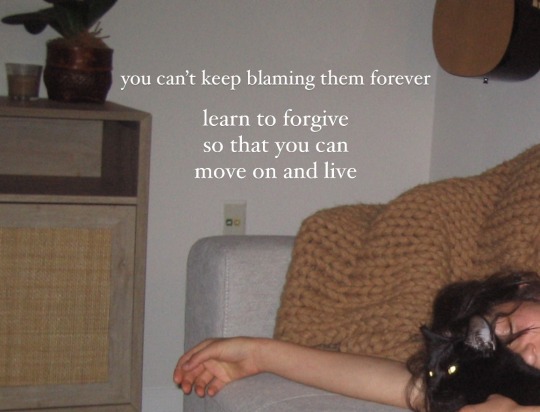
blame means you are hurt, hurt is anger, anger is grief, grief is love or a lack thereof
#sotce#self care#poem#prose#sotce inspired#girblogger#just girly thoughts#poetry#positive mental attitude#plants#cat#black cat#cats of tumblr#kitty#forgiveness#i forgive you#good omens meta#ineffable heartbreak#i wish you all the best#love#i love you#i miss you#feelings#grief is weird#self love#love quotes#life#feel#writing#writer stuff
21 notes
·
View notes
Text
“their miracle was so big bc crowley used to be an archangel” have u considered that aziraphale and crowley love each other so much that their love alone could move the tides just by staring at the ocean for too long. have u considered that they did the miracle not really to protect gabriel but to protect what they had, what they’d built with each other. and that was them barely even trying
#sorry but the whole ‘crowley was an archangel’ take is not the one for this scenario#the whole thesis of the show is that they’re more powerful and at their best when they’re together#their combined miracle is just a manifestation of that#and i can’t wait to see how they use that bit in s3#good omens#good omens meta#go2 spoilers#thoughts
35K notes
·
View notes
Text
Awhile ago @ouidamforeman made this post:
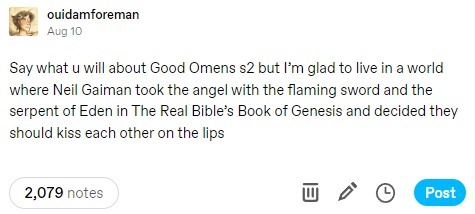
This shot through my brain like a chain of firecrackers, so, without derailing the original post, I have some THOUGHTS to add about why this concept is not only hilarious (because it is), but also...
It. It kind of fucks. Severely.
And in a delightfully Pratchett-y way, I'd dare to suggest.
I'll explain:
As inferred above, both Crowley AND Aziraphale have canonical Biblical counterparts. Not by name, no, but by function.
Crowley, of course, is the serpent of Eden.
(note on the serpent of Eden: In Genesis 3:1-15, at least, the serpent is not identified as anything other than a serpent, albeit one that can talk. Later, it will be variously interpreted as a traitorous agent of Hell, as a demon, as a guise of Satan himself, etc. In Good Omens --as a slinky ginger who walks funny)
Lesser known, at least so far as I can tell, is the flaming sword. It, too, appears in Genesis 3, in the very last line:
"So he drove out the man; and placed at the east of the garden of Eden Cherubims, and a flaming sword which turned every way, to keep the way of the tree of life."
--Genesis 3:24, KJV
Thanks to translation ambiguity, there is some debate concerning the nature of the flaming sword --is it a divine weapon given unto one of the Cherubim (if so, why only one)? Or is it an independent entity, which takes the form of a sword (as other angelic beings take the form of wheels and such)? For our purposes, I don't think the distinction matters. The guard at the gate of Eden, whether an angel wielding the sword or an angel who IS the sword, is Aziraphale.
(note on the flaming sword: in some traditions --Eastern Orthodox, for example-- it is held that upon Christ's death and resurrection, the flaming sword gave up it's post and vanished from Eden for good. By these sensibilities, the removal of the sword signifies the redemption and salvation of man.
...Put a pin in that. We're coming back to it.)
So, we have our pair. The Serpent and the Sword, introduced at the beginning and the end (ha) of the very same chapter of Genesis.
But here's the important bit, the bit that's not immediately obvious, the bit that nonetheless encapsulates one of the central themes, if not THE central theme, of Good Omens:
The Sword was never intended to guard Eden while Adam and Eve were still in it.
Do you understand?
The Sword's function was never to protect them. It doesn't even appear until after they've already fallen. No... it was to usher Adam and Eve from the garden, and then keep them out. It was a threat. It was a punishment.
The flaming sword was given to be used against them.
So. Again. We have our pair. The Serpent and the Sword: the inception and the consequence of original sin, personified. They are the one-two punch that launches mankind from paradise, after Hell lures it to destruction and Heaven condemns it for being destroyed. Which is to say that despite being, supposedly, hereditary enemies on two different sides of a celestial cold war, they are actually unified by one purpose, one pivotal role to play in the Divine Plan: completely fucking humanity over.
That's how it's supposed to go. It is written.
...But, in Good Omens, they're not just the Serpent and the Sword.
They're Crowley and Aziraphale.
(author begins to go insane from emotion under the cut)
In Good Omens, humanity is handed it's salvation (pin!) scarcely half an hour after losing it. Instead of looming over God's empty garden, the sword protects a very sad, very scared and very pregnant girl. And no, not because a blameless martyr suffered and died for the privilege, either.
It was just that she'd had such a bad day. And there were vicious animals out there. And Aziraphale worried she would be cold.
...I need to impress upon you how much this is NOT just a matter of being careless with company property. With this one act of kindness, Aziraphale is undermining the whole entire POINT of the expulsion from Eden. God Herself confronts him about it, and he lies. To God.
And the Serpent--
(Crowley, that is, who wonders what's so bad about knowing the difference between good and evil anyway; who thinks that maybe he did a GOOD thing when he tempted Eve with the apple; who objects that God is over-reacting to a first offense; who knows what it is to fall but not what it is to be comforted after the fact...)
--just goes ahead and falls in love with him about it.
As for Crowley --I barely need to explain him, right? People have been making the 'didn't the serpent actually do us a solid?' argument for centuries. But if I'm going to quote one of them, it may as well be the one Neil Gaiman wrote ficlet about:
"If the account given in Genesis is really true, ought we not, after all, to thank this serpent? He was the first schoolmaster, the first advocate of learning, the first enemy of ignorance, the first to whisper in human ears the sacred word liberty, the creator of ambition, the author of modesty, of inquiry, of doubt, of investigation, of progress and of civilization."
--Robert G. Ingersoll
The first to ask questions.
Even beyond flattering literary interpretation, we know that Crowley is, so often, discreetly running damage control on the machinations of Heaven and Hell. When he can get away with it. Occasionally, when he can't (1827).
And Aziraphale loves him for it, too. Loves him back.
And so this romance plays out over millennia, where they fall in love with each other but also the world, because of each other and because of the world. But it begins in Eden. Where, instead of acting as the first Earthly example of Divine/Diabolical collusion and callousness--
(other examples --the flood; the bet with Satan; the back channels; the exchange of Holy Water and Hellfire; and on and on...)
--they refuse. Without even necessarily knowing they're doing it, they just refuse. Refuse to trivialize human life, and refuse to hate each other.
To write a story about the Serpent and the Sword falling in love is to write a story about transgression.
Not just in the sense that they are a demon and an angel, and it's ~forbidden. That's part of it, yeah, but the greater part of it is that they are THIS demon and angel, in particular. From The Real Bible's Book of Genesis, in the chapter where man falls.
It's the sort of thing you write and laugh. And then you look at it. And you think. And then you frown, and you sit up a little straighter. And you think.
And then you keep writing.
And what emerges hits you like a goddamn truck.
(...A lot of Pratchett reads that way. I believe Gaiman when he says Pratchett would have been happy with the romance, by the way. I really really do).
It's a story about transgression, about love as transgression. They break the rules by loving each other, by loving creation, and by rejecting the hatred and hypocrisy that would have triangulated them as a unified blow against humanity, before humanity had even really got started. And yeah, hell, it's a queer romance too, just to really drive the point home (oh, that!!! THAT!!!)
...I could spend a long time wildly gesturing at this and never be satisfied. Instead of watching me do that (I'll spare you), please look at this gif:
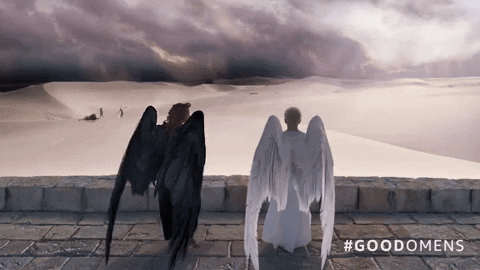
I love this shot so much.
Look at Eve and Crowley moving, at the same time in the same direction, towards their respective wielders of the flaming sword. Adam reaches out and takes her hand; Aziraphale reaches out and covers him with a wing.
You know what a shot like that establishes? Likeness. Commonality. Kinship.
"Our side" was never just Crowley and Aziraphale. Crowley says as much at the end of season 1 ("--all of us against all of them."). From the beginning, "our side" was Crowley, Aziraphale, and every single human being. Lately that's around 8 billion, but once upon a time it was just two other people. Another couple. The primeval mother and father.
But Adam and Eve die, eventually. Humanity grows without them. It's Crowley and Aziraphale who remain, and who protect it. Who...oversee it's upbringing.
Godfathers. Sort of.
#good omens#ineffable husbands#aziracrow#good omens 2#crowley#aziraphale#good omens meta#I have no idea if I've made a coherent point here but I'm tired of this being in my drafts; RAW FEELINGS IT IS#it's about being sent to destroy and instead staying to love and protect and nurture I'M CRAZY I'M CRAZY RAAAAAAAGGHHHH#gnu terry pratchett
27K notes
·
View notes
Text
crowley must have known that aziraphale was also in love with him, he tidied the bookshop, he was planning on taking him to the Ritz after his confession, he had their song queued in the car these are not acts of someone who wasn't sure what the outcome will be.
which makes it so much more painful that he still confessed his love for aziraphale with tears in his eyes and on the verge of a full blown panic attack, he left saying "don't bother" but he still waited by his car til the elevator doors closed. all because

#alex says things#I’m going to jump off a cliff btw#good omens#ineffable husbands#good omens season 2#aziraphale#crowley#aziracrow#good omens meta
22K notes
·
View notes
Text
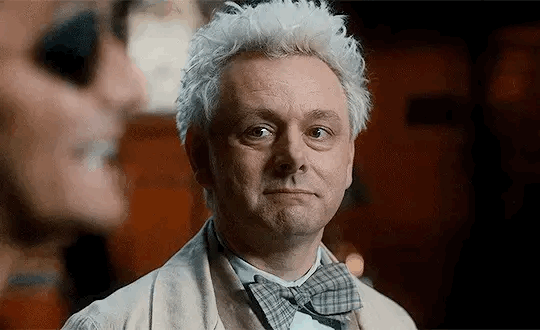
So, I feel like I’m losing my mind. I keep seeing metas about how Aziraphale wants Crowley to return to Heaven and be an angel again because he wants them to be on the same side/be good/change/etc., etc., etc. but I don’t see that at all. I actually see it as the very opposite.
Aziraphale loves Crowley just as he is. But there’s something more. Something huge.
Aziraphale loves Crowley and because he is an angel who is stuck in seeing things as black and white, he constantly praises Crowley for being nice. For being good. For being kind.
Aziraphale has watched Crowley on and off for 6,000 years. He watched him thwart the plans of Heaven and Hell because it was unjust. He spared the lives of innocents. He did small things that made Aziraphale happy just because (like making Hamlet successful and saving valuable books). And because Aziraphale sees things in black and white, he sees all the things Crowley has done as nice, as good, as kind.
Crowley vehemently attests he’s not nice or good or kind.
He’s not exactly wrong nor is he lying when he says this. When Crowley spares goats during a cruel bet over a righteous man and swallowing laudanum to prevent a suicide, when he prevents Armageddon by working with Aziraphale and stopping the Anti-Christ from being the Anti-Christ, he’s not doing the nice/good/kind thing.
He’s doing the right thing.
Crowley chooses to do the right thing without hesitation. He is better than all of Heaven and Hell who have callous and dispassionate view of all existence because he questions, because he makes choices. Crowley sees the world for all its messiness and he sees himself. He sees a place where he fits in. He sees the blurred edges.
And Aziraphale sees that, even if seeing the blurred edges is hard for him.
But here’s the thing that Aziraphale can’t voice.
It’s the reason why he told Crowley about being allowed to return to Heaven and become an angel again. He doesn’t want Crowley to change. He doesn’t think Crowley is flawed. Or not enough.
It’s something that is so monumental that it cannot be put into words. Because to put it into words would be more than blasphemy. It’s down right unthinkable for anyone in Heaven, Hell, or Earth to say what Aziraphale knows deep in his soul.
God was wrong to cast out Crowley.
Aziraphale believes Crowley can/should return to Heaven because he knows that Crowley should never have fallen in the first place. He wants him to be forgiven because when Crowley fell it was unjust. Aziraphale is trying to correct a mistake. He’s trying to do the right thing.
Yes, Crowley would never accept returning to Heaven. And Aziraphale was wrong to even suggest it (although that conversation is another can of worms to unpack).
Aziraphale loves Crowley. He loves him exactly as he is. He doesn’t want him to change. Aziraphale knows that Crowley the best of all of them. He wants to change Heaven because of it. Because God was wrong and Aziraphale knows it.
Aziraphale may have difficulty seeing beyond black and white, but when it comes to Crowley he sees everything crystal clear and in vivid color.

#good omens#good omens 2#good omens meta#hold on to your butts#because here be outright blasphemy#aziraphale#crowley#neil gaiman#warning this post has been known to cause psychic damage#and in one instance a proposal of marriage#neil liked this post#whaaaaaaaaaaat#good omens spoilers#michael sheen#david tennant#ineffable husbands#tell me I’m wrong
26K notes
·
View notes
Text
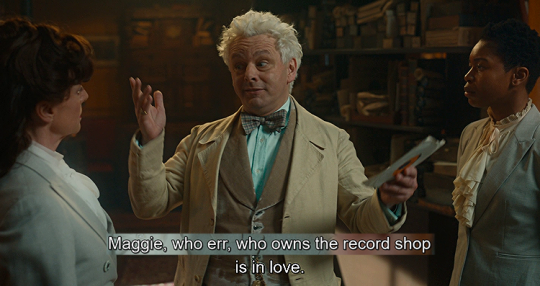
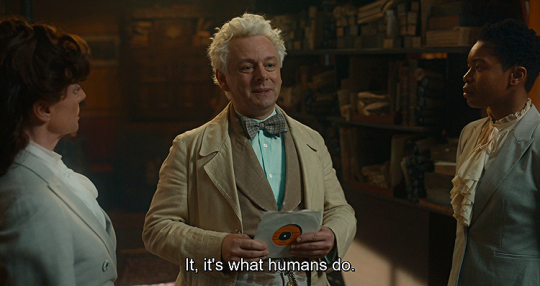
Can we go back to this for a sec? To Aziraphale having to explain the concept of being in love to the other angels? Because I cannot imagine what a trip it has to be, falling in love with someone when that is literally not something you are supposed to be able to do. When it is something you barely understand. When the object of whatever this is isn't supposed to be able to feel this way either, except as time goes on you start to realize it's happening to him too. And neither of you can actually talk to each other about it.
#here they are infected by humanity in the best way but at the same time it's also a trap because what can they do with it#The concept of falling in love for angels is useless at best and blasphemous at worst!#You're supposed to be devoted to God alone#and forget demons#they're from the same stock and anyway you're supposed to be out for yourself#v watches good omens#good omens meta#aziraphale
17K notes
·
View notes